When Calvin Holbrook started hyperventilating and having chest pains on a bus in the middle of the motorway, he thought he was having a heart attack. In fact, it was his first panic attack – one of many that were to come. Here's how he learned to cope.
A weird tingling began in the fingers of both hands before slowly spreading up my arms towards my shoulders. At the same time, the left-side of my chest clammed up tight and I was struggling to breathe. Sweat started to pour from my palms and my heart was pounding.
Feeling dizzy, I was struggling to understand what was happening. A dreaded feeling like I was about to die washed over me: was I having a heart attack? A sudden urge to get up and run home as fast as possible hit me. But I couldn’t do that. Why? Because I was speeding down the motorway from Stanstead Airport to central London on a packed bus full of tourists. Great.
I didn't know it, but I was, in fact, having my first panic attack. Likewise, I didn’t know it then but these were symptoms I’d continue to endure and try to manage over the next few years. In reality, they're symptoms I still have to manage, sometimes on a day-to-day basis, and which have – at times – had a real impact on my happiness.
Panic attacks: my first experience
It may sound dramatic, but what happened that day on the bus really did change my life. Terrified I was having a heart attack, I crawled out of my seat to the driver who was, of course, trying to concentrate on not killing us all while driving into London. But it already felt like I was dying! I sat and described my symptoms to him, but obviously he couldn’t just pull-up as we were in the middle of the motorway. He calmly asked me to sit in the corridor and rest and said we’d stop as soon as it was possible. 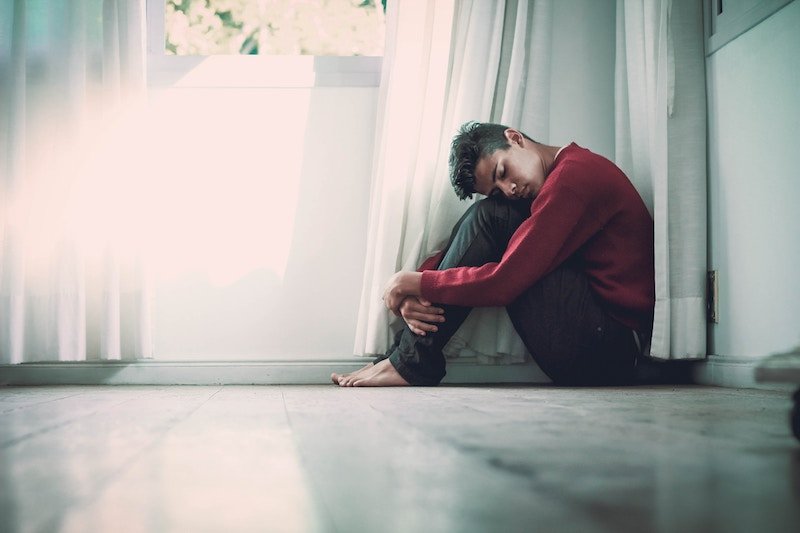
Home alone: panic attacks can leave you feeling isolated
Thankfully, one lovely lady came and sat with me, telling me to take deep breaths into my tummy. She also called for an ambulance. I felt so embarrassed and could hear everyone else on the bus talking and even complaining about what was happening, but the kindness from this one person really help me through.
“Feeling dizzy, I was struggling to understand what was happening. A dreaded feeling like I was about to die washed over me: was I having a heart attack?”
Eventually we reached the hard shoulder and the bus pulled over. I got off, still struggling to breathe, and sat with my head between my legs. When the ambulance crew arrived they took my blood, gave me oxygen and asked a few questions. My blood results were clear for a heart attack but the paramedics didn’t specifically say what had happened either which left me worried. They said I could go to hospital but it would probably be a waste of time, so, after I’d calmed down, I headed to the nearest Tube station to make my way to my friend’s place where I was staying. It was then that I vomited – luckily, in a bin on the station platform: the stress of my first panic attack had clearly taken its toll on my body.
Panic attacks: the aftermath
The next day, the anxiety had come and gone but some of the physical symptoms still sat with me. My chest felt so tender, like it was bruised inside. In fact, this pain lasted for months afterwards, leaving me convinced it was something more than a panic attack and that I'd definitely had a heart attack. I felt exhausted for weeks, too, like I’d been knocked over by a bus – instead of just having my first anxiety attack on one!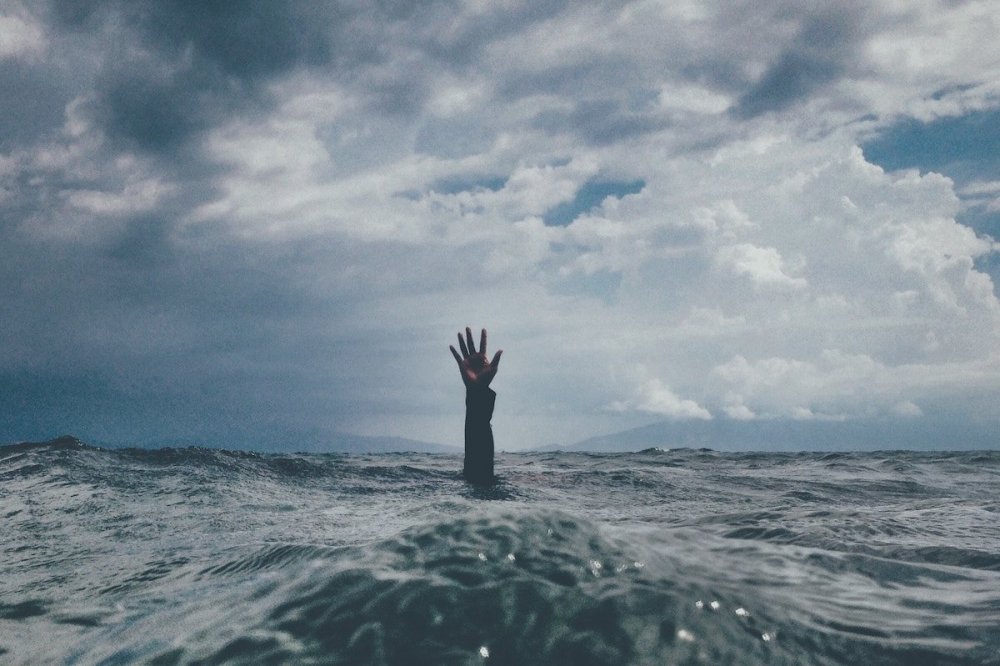
Helping hand: anxiety attacks feel like you're drowning in panic, but you can get better
But, as anyone who lives with panic attacks or panic disorder knows, that’s the thing: during the attack, the symptoms are so physical they can be totally debilitating. When I first suffered this enormous bout of anxiety I thought, 'Can worry and anxiety really make my body react in such an extreme?' As I started researching the condition online, the answer of course was, hell, yes!
Panic attacks: the science bit
Aside from being one of the most terrifying things you can ever go through, according to the NHS, a panic attack is ‘a feeling of sudden and intense anxiety. They can have physical symptoms, including shaking, feeling disorientated, nausea, rapid, irregular heartbeats, dry mouth, breathlessness, sweating and dizziness. The symptoms of a panic attack are not dangerous, but can be very frightening.’
In fact, these physical symptoms are caused by your body going into so-called ‘fight or flight’ mode: it’s preparing to fight for survival from some threat (known or unknown). Hormones including adrenaline are released, causing the heart to beat faster and your muscles to tense up.
So, as your body tries to take in more oxygen, your breathing speeds up. And that’s about the time that you’ll probably start freaking out. But the really important thing to remember – although it’s very hard in the moment – is that your life is not in danger when you're having an anxiety attack.
What causes panic attacks?
Annoyingly, they can begin suddenly, without any warning, striking at any time. However, sometimes there are triggers: it could be from drinking too much caffeine, taking drugs or other stimulants, or because you're going through a worrying and stressful period (check, check, check!). To be honest, I think my first panic attack was a mixture of all three. I’d been out the night before, hadn’t slept, and then gone to the airport to take a plane to London. In hindsight, this was, of course, a Very Stupid Thing To Do.
RELATED: How to help someone having a panic attack – 7 key tips
After you’ve had a few panic attacks, you start to learn what the triggers are. For me, coffee is definitely a biggie, as is consuming too much booze the night before. I’ve managed to cut down on both (although cutting coffee is way harder than alcohol) and have definitely noticed a decrease in attacks. However, these intense, terrifying rushes of anxiety have become a part of my life and learning to cope with panic attacks is a method of survival.
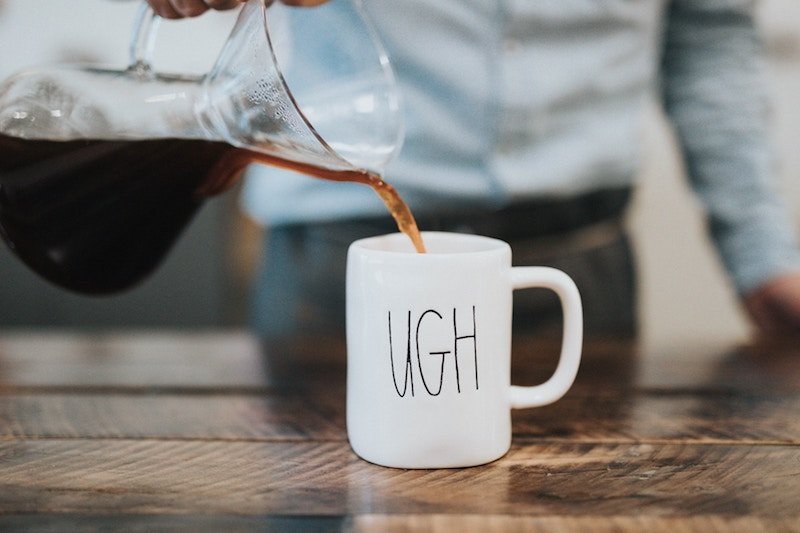
Quit the coffee: caffeine can trigger attacks
Living with anxiety
While some people may only have a first-ever panic attack and no more, for the less fortunate, like myself, they can become a regular and debilitating occurrence. More often than not, they come on completely out of the blue: here are just a few of the places I’ve had panic attacks:
- in the swimming pool
- waiting for food at a restaurant (I had to do a runner before the meal arrived)
- in the supermarket
- in a lift (and I wasn’t even trapped in it)
- at my desk at work (rushing to the toilets to deep breath)
- on a train
- on an airplane, as it was about to take off
- actually, pretty much on every mode of public transport
- at the sauna. Twice. (yes, probably the most relaxing place you could be)
- in my bed, my usual post-panic attack go-to space, after a big night out partying
Since my first panic attack, I’ve ended up calling ambulances or going to A&E on three or four separate occasions. Each time I was convinced there was something very wrong with me and that it was more than just an anxiety attack– but each time it proved to be just that.
“The really important thing to remember – although it’s very hard in the moment – is that your life is not in danger when you're having an anxiety attack.”
Indeed, one of the toughest things to do is to train yourself to realize when you’re in a moment of panic and that it will pass eventually. Psychologists recommend that the best thing to do is to try and ride it out, instead of trying to run away from it. If you try to fight the fear, it just grips around you even more.
RELATED: How to stop a panic attack – 12 tips on what to do
In fact, the quickest and best way to deal with panic attacks is to stop and take long, deep breaths into your tummy for seven seconds, hold another seven, then out for seven seconds. This regulates your oxygen/carbon dioxide levels and helps bring your heart rate back to normal after some time.
Anxiety attacks, panic disorder and agoraphobia
When anxiety attacks become a regular occurrence, it’s defined as panic disorder. Sufferers will even try to avoid places or situations which remind them of past panic attacks, and in worst case scenarios, this can lead to agoraphobia.
Luckily, I haven’t reached that stage yet, but some days I’ve felt more comfortable just staying in, rather than risk the fear of having a repeat attack. It seems I’m in good company, though, as celebrated author Matt Haig has lived with them for years, something he describes so well in his recent memoir, Reasons To Stay Alive, which is full of easy-to-read chapters on how to deal with panic attacks, anxiety, depression and mental health. 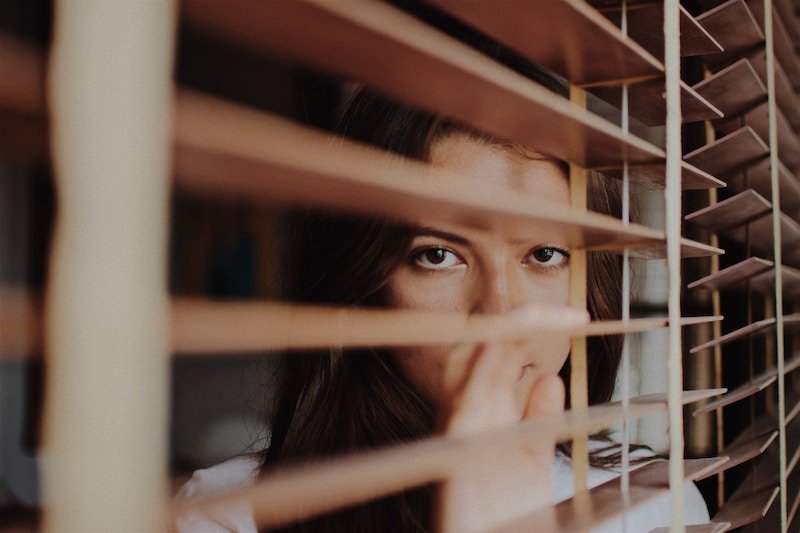
Behind closed doors. don't become trapped in fear of panic
I can still clearly remember that horrific first bus journey but, thankfully, the memories are subsiding and I’m learning to live with my anxiety. Just like my horror bus ride, living with panic attacks is also a journey, but one you can learn to deal with and control.
If you’re reading this because you’ve just had your first panic attack, know that you can get help and learn to manage them. And while they can be really horrible while you’re going through them, at some point you will calm down and your body will return to its regular state. While panic attacks are indeed hideous and have made me feel like utter crap, one of the worst things for me is the giving up coffee thing. I mean, can you imagine? Have you tasted decaf? ●
Are you living with panic/anxiety attacks? Do you remember your first one? Share your experience with the community below…
Written by Calvin Holbrook
 Calvin edits our magazine and is a lover of swimming, yoga, dancing to house/techno, and all things vintage. Find out more.
Calvin edits our magazine and is a lover of swimming, yoga, dancing to house/techno, and all things vintage. Find out more.
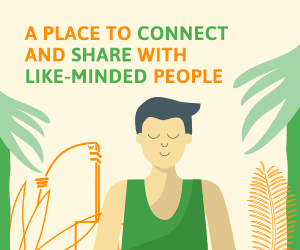


Join the conversation
You are posting as a guest. If you have an account, sign in now to post with your account.